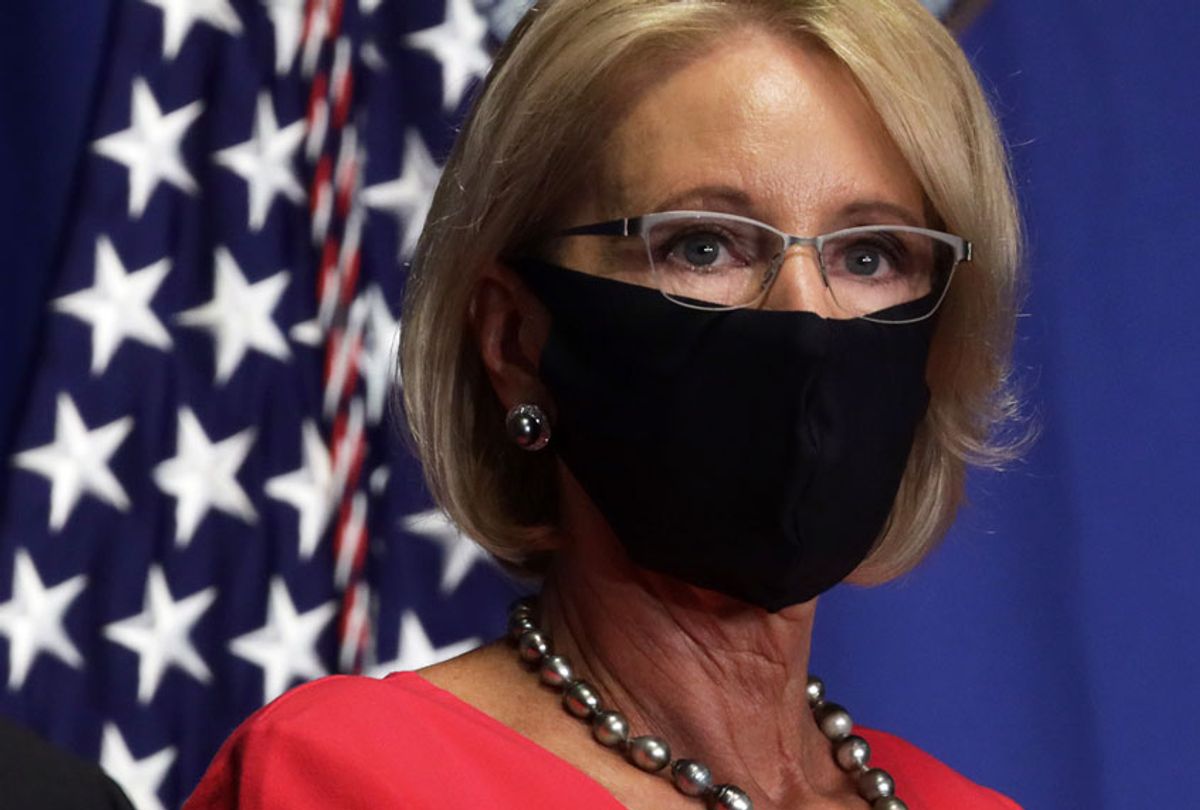Teachers and other education advocates are feeling giddy at the possibility of moving forward a progressive agenda that the current education secretary, Betsy DeVos, stopped dead in its tracks four years ago. President-elect Joe Biden campaign's policy director, Stef Feldman, told the Education Writers Association that as president, Biden would "get some big, bold education legislation passed and certainly immediate relief for our schools and our educators," and said Biden would take executive actions as well. Many of those executive actions, education advocates hope, will de-DeVos the Department of Education.
Here are some of the likeliest ways public education will change in a Biden-Harris administration.
Enforce all students' civil rights
Earlier this year, Betsy DeVos announced sweeping revisions to the federal civil rights law Title IX, which prevents discrimination on the basis of sex in federally funded schools. As a result, a judicial-like process is now used to investigate sexual harassment complaints, giving the accused a right to cross-examine accusers in a live hearing. Student advocates have said this would deter survivors from reporting assaults, which were already underreported.
Biden has also vowed to restore Obama-era civil rights guidance letters, which were rescinded by DeVos. Those include allowing transgender students to choose their own restrooms, addressing the disproportionate disciplining of Black students and pressing for diversity in colleges and K-12 classrooms.
"The good news is that Secretary DeVos has been more effective at doing damage to Obama-era policies than at creating anything new," Kevin Welner, director of the National Education Policy Center, told Capital & Main. "So the first and easiest items on the Biden education checklist should be reissuing — and perhaps even strengthening — Obama-era guidance letters. I call this process 'de-DeVos-ing.'"
Spending on K-12 will increase
For several years Trump/DeVos proposed major federal spending cuts to education that were rejected by Congress, including zeroing out the budget for after-school programs for needy youth. In a Biden administration, Congress will likely be asked to approve increased education spending.
Biden has promised to triple Title I aid for low-income schools, with requirements for higher teacher pay, and vowed to double the number of psychologists, counselors, nurses and social workers in schools. He has promised to invest in school infrastructure to address health risks and dramatically increase funding for special education. Unlike DeVos, Biden also wants the federal government to fund universal prekindergarten for all 3- and 4-year-old children, make community college debt-free, and double Pell grants for low-income and middle class students.
Paying for college may become easier
For four years in a row, DeVos proposed dismantling the Public Service Loan Forgiveness program, which was created in 2007 with bipartisan support. She has also proposed slashing subsidized federal student loans, work-study funding and parent PLUS loans.
In addition to promises to shore up these programs, Biden said he supports canceling $10,000 of debt per student — far less than what rivals for the Democratic nomination had advocated — as well as making community college free, doubling Pell grants and making public colleges tuition-free to people earning under $125,000 annually.
The new administration is likely to prioritize the immense backlog of loan forgiveness claims that DeVos let pile up, and reverse denials of assistance to students claiming to be cheated by for-profit colleges. As attorney general of California, Vice President-elect Kamala Harris sued the now-defunct Corinthian Colleges for fraud and predatory practices.
School districts to have more guidance on education regulations
Educators championed the Every Student Succeeds Act (ESSA), which replaced the widely disparaged No Child Left Behind Act (NCLB) in 2015, but according to National Education Association president Becky Pringle, the Department of Education under DeVos gave states, cities and districts no guidance on how to implement it. (Disclosure: The NEA is a financial supporter of this website.)
"[DeVos] was not interested in it," said Pringle. ESSA, she added, reformed NCLB "to focus on equity and access to education and parent voices to help all students have access to quality counselors and teachers and digital tools. ESSA rolls back emphasis on testing and focuses on the whole student, a holistic approach. States were to develop different assessment systems but they needed leadership and it wasn't there."
Shrink the digital divide
COVID-19 has exposed the digital divide among schoolchildren — and possibly widened it. But a new COVID relief package could remedy this. The HEROES Act, passed by the Democratic House but ignored by the Republican Senate, called for $1.5 billion through the Federal Communications Commission's E-Rate program, plus $4 billion to states and cities to connect low-income families with broadband.
More COVID relief is likely, though it's not clear what form it would take. This week both Senate Majority Leader Mitch McConnell and Senate Minority Leader Chuck Schumer have agreed to take on a new bill, though McConnell has said it must be "highly targeted" (i.e., much smaller). Still, Democrats are pushing for the $4 billion for e-learning technology.
In addition to urging Congress to pass a COVID relief bill with money earmarked for broadband, Biden has pledged to work with Congress to pass legislation to connect more Americans with broadband, and to increase funding for Community Connect Grants to rural America.
Could Congress scuttle Biden's plans?
Some plans, like rolling back DeVos' Title IX changes, can be done by executive order, but Congress must approve any changes involving the budget. If Republicans win the two Georgia Senate runoff races in January, the Senate will be led by McConnell, who is already scolding Democrats about the budget deficit.
Still, Pringle thinks that if any president can twist Republican arms, Biden can. "Biden knows how the Senate works," she said, "and he lives up to his word and has demonstrated willingness and temperament and determination to help us move forward." But Pringle cautioned that activists must also pressure representatives to fund Biden's initiatives: "We had a record level of activism to get a new president. But we can't just get people elected. We must show up daily with a grassroots push to help Biden-Harris."
Several of the president-elect's cabinet picks, including, possibly, secretary of education, will be announced Tuesday, according to Biden's chief of staff Ron Klain.
Copyright 2020 Capital & Main




Shares